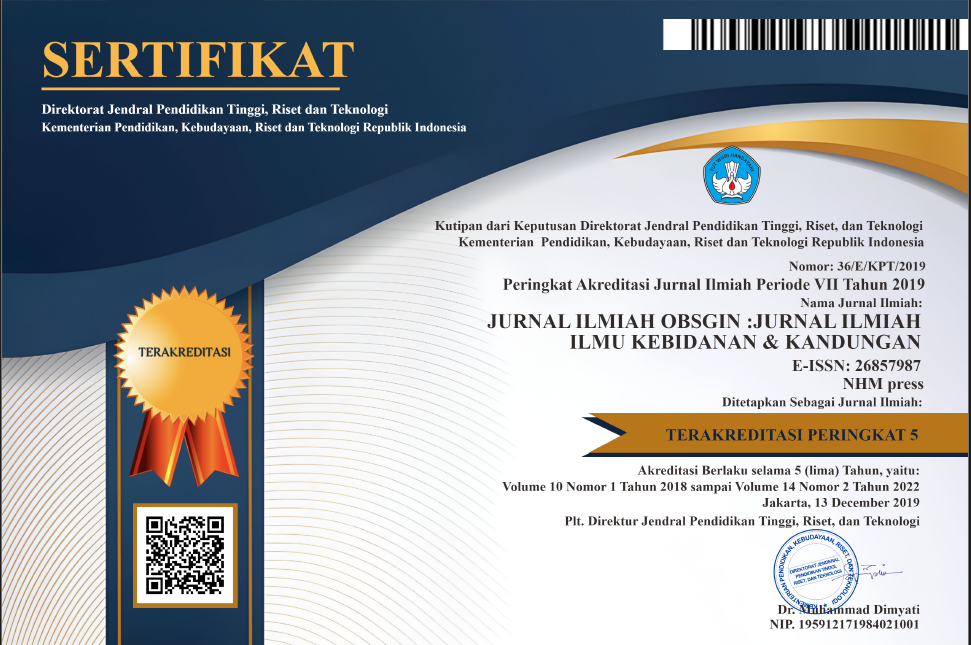Kekerasan Berbasis Pasangan Sebagai Pemicu Depresi Postpartum
Abstract
Depresi Postpartum merupakan masalah kesehatan mental yang umum terjadi pada masa postpartum. Faktor yang memicu depresi postpartum sangat beragam dan salah satu yang diyakini menjadi pemicunya adalah pajanan intimate partner violence (IPV). IPV merupakan tindakan/ ancaman yang mengakibatkan kesakitan pada korban yang dilakukan oleh pasangan. Metode yang digunakan dalam penelitian ini adalah penelusuran literatur. Berbagai hasil observasi menunjukkan bahwa pajanan IPV menyebabkan gangguan hormonal terutama peningkatan hormon kortisol bagi korban sehingga dapat memicu kondisi stres kronis. Kondisi stres yang dialami korban ditatalaksana dengan pemeriksaan secara komprehensif melalui skrining psikopatologi, pemeriksaan fisik dan pemeriksaan penunjang terkait gejala atau perlakuan tindakan yang menyebabkan injuri. Stres kronis akibat injuri fisik maupun injuri mental bisa diterapi menggunakan terapi farmakologi maupun non-farmakologi berupa pemberian antidepresan atau terapi kognitif bagi pasangan/pelaku kekerasan dan korban.
References
An, J. H., Moon, C. S., Kim, D. E., Lee-Tauler, S. Y., Jeon, H. J., Cho, S. J., Sung, S. J., & Hong, J. P. Prevalence of intimate partner violence victimization and its association with mental disorders in the Korean general population. Archives of women’s mental health, 22, 2019, 751–758.
Brown, J., Clark, D., & Pooley, A. E. Exploring the use of neurofeedback therapy in mitigating symptoms of traumatic brain injury in survivors of intimate partner violence. Journal of Aggression, Maltreatment & Trauma, 28(6), 2019, 764–783.
Brummelte, S., & Galea, L. A. M. Postpartum depression: Etiology, treatment and consequences for maternal care. Hormones and behavior, 77, 2016, 153–166.
Amna, Z., & Khairani, M. FAKTOR-FAKTOR RISIKO DEPRESI PADA IBU PASCA BERSALIN The Risk Factors for Depression in Postpartum Moms Abstract. 17(1), 2024, 28–40.
An, J. H., Moon, C. S., Kim, D. E., Lee-Tauler, S. Y., Jeon, H. J., Cho, S. J., Sung, S. J., & Hong, J. P. Prevalence of intimate partner violence victimization and its association with mental disorders in the Korean general population. Archives of women’s mental health, 22, 2019, 751–758.
Brown, J., Clark, D., & Pooley, A. E. Exploring the use of neurofeedback therapy in mitigating symptoms of traumatic brain injury in survivors of intimate partner violence. Journal of Aggression, Maltreatment & Trauma, 28(6), 2019, 764–783.
Brummelte, S., & Galea, L. A. M. Postpartum depression: Etiology, treatment and consequences for maternal care. Hormones and behavior, 77, 2016, 153–166.
Choi, A. W. M., Lo, B. C. Y., Wong, J. Y. H., Lo, R. T. F., Chau, P. C. W., Wong, J. K. S., Lau, C. L., & Kam, C. W. Clinical Features of Heterosexual Intimate Partner Violence Victims With Escalating Injury Severity. Journal of Interpersonal Violence, 36(17–18), 2021, 8585–8605. https://doi.org/10.1177/0886260519850539
Crane, C. A., Rice, S. L., & Schlauch, R. C. Development and psychometric evaluation of a rapid intimate partner violence perpetration screening tool. Aggressive behavior, 44(2), 2018, 199–208.
Dawson, D. N., Volpe, V. V, & Laurent, H. K. Synergistic effects of psychological intimate partner violence exposure and gender discrimination on postnatal mental health trajectories. Journal of interpersonal violence, 2021, 36(15–16), NP8907–NP8932.
Fuller, G. The Use of Dance/Movement Therapy to Improve Stabilization of Trauma Responses in Survivors of Intimate Partner Violence: A Literature Review, 2019.
Ghaedrahmati, M., Kazemi, A., & Kheirabadi, G. Postpartum depression risk factors, 2017. https://doi.org/10.4103/jehp.jehp
Gora, R., & Risqi Inayah. Perspektif Feminis Dalam Media Komunikasi Film Oleh : Radita Gora Tayibnapis dan Risqi Inayah Dwijayanti Penulis : Radita Gora Tayibnapis dan Risqi Inayah Dwijayanti adalah Dosen Ilmu Komunikasi Universitas Satya Negara Indonesia . Abstrak Keberadaan kont. 1(2), 2018, 174–211.
Irvana. Faktor-Faktor yang Mempengaruhi Kejadian Depresi Postpartum di RSUD Labuang Baji Makassar. 3(April), 2021, 61–66.
Iverson, K. M., Dardis, C. M., & Pogoda, T. K. Traumatic brain injury and PTSD symptoms as a consequence of intimate partner violence. Comprehensive psychiatry, 74, 2017, 80–87.
Kartikasari, D. E., Saudah, N., & Peni, T. (n.d.). HUBUNGAN TINGKAT KECEMASAN DENGAN GANGGUAN SIKLUS MENSTRUASI PADA REMAJA : STUDI LITERATURE REVIEW. 1–14.
Kim, J. Y., Lee, J. H., Song, H. J., Kim, D. G., & Yim, Y. S. Relationships between psychosocial difficulties and oxidative stress biomarkers in women subject to intimate partner violence. Health & Social Work, 42(1), 2017, 41–47.
Lawal, A. M., & Idemudia, E. S. Examining maternal age, breastfeeding self-efficacy and health locus of control in psychological wellbeing of mothers. Psychology, Health and Medicine, 22(10), 2017, 1230–1238. https://doi.org/10.1080/13548506.2017.1317824
Marzali, Amri. Menulis Kajian Literatur. Jurnal Etnosia. 1(2), 2016, 112-117.
Matteoli, M., Piacentino, D., Kotzalidis, G. D., Serata, D., Rapinesi, C., Angeletti, G., Rossi, M., David, V., & De Dominicis, C. The clinical and radiological examination of acute intimate partner violence injuries: a retrospective analysis of an Italian cohort of women. Violence and victims, 31(1), 2016, 85–102.
Moore, S., Fox, R., Nic, B., Easpaig, G., & Deravin, L. Family and domestic violence policy discourses and narratives : implications for Emergency Departments and communities in rural Australia. International Journal for Equity in Health, 2023, 1–23. https://doi.org/10.1186/s12939-023-01873-y
Morris, M. C., Abelson, J. L., Mielock, A. S., & Rao, U. Psychobiology of cumulative trauma: hair cortisol as a risk marker for stress exposure in women. Stress, 20(4), 2017, 350–354. https://doi.org/10.1080/10253890.2017.1340450
O’Neil, A., & Scovelle, A. J. Intimate partner violence perpetration and cardiovascular risk: a systematic review. Preventive medicine reports, 10, 2018, 15–19.
Pinto, R. J., Correia-Santos, P., Costa-Leite, J., Levendosky, A. A., & Jongenelen, I. Cortisol awakening response among women exposed to intimate partner violence. Psychoneuroendocrinology, 74, 2016, 57–64.
Portnoy, G. A., Haskell, S. G., King, M. W., Maskin, R., Gerber, M. R., & Iverson, K. M. (2018). Accuracy and acceptability of a screening tool for identifying intimate partner violence perpetration among women veterans: A pre-implementation evaluation. Women’s health issues, 28(5), 2018, 439–445.
Robertson Blackmore, E., Mittal, M., Cai, X., Moynihan, J. A., Matthieu, M. M., & O’Connor, T. G. Lifetime exposure to intimate partner violence and proinflammatory cytokine levels across the perinatal period. Journal of Women’s Health, 25(10), 2016, 1004–1013.
Rogathi, J. J., Manongi, R., Mushi, D., Rasch, V., Sigalla, G. N., Gammeltoft, T., & Meyrowitsch, D. W. Postpartum depression among women who have experienced intimate partner violence: A prospective cohort study at Moshi, Tanzania. Journal of affective disorders, 218, 2017, 238–245.
Romero-Martínez, Á., Blasco-Ros, C., Martínez, M., & Moya-Albiol, L. Hormonal alterations in victimized women explained by their hostile reactions in coping with couple violence. The Spanish Journal of Psychology, 22, E40, 2019.
Saharoy, R., Potdukhe, A., Wanjari, M., & Taksande, A. B. Postpartum Depression and Maternal Care : Exploring the Complex Effects on Mothers and Infants. 15(7), 2023. https://doi.org/10.7759/cureus.41381
Sari, R. A., Kedokteran, F., & Lampung, U. Literature Review : Depresi Postpartum Literature Review : Postpartum Depression. 11, 2020, 167–174.
Satyjeet, F. N. U., Naz, S., Kumar, V., Aung, N. H., Bansari, K., & Irfan, S. Psychological Stress as a Risk Factor for Cardiovascular Disease : A Case-Control Study. 12(10), 2020, 10–13. https://doi.org/10.7759/cureus.10757
Schechter, D. S., Moser, D. A., Pointet, V. C., Aue, T., Stenz, L., Paoloni-Giacobino, A., Adouan, W., Manini, A., Suardi, F., & Vital, M. The association of serotonin receptor 3A methylation with maternal violence exposure, neural activity, and child aggression. Behavioral brain research, 325, 2017, 268–277.
Tabb, K. M., Huang, H., Valdovinos, M., Toor, R., Ostler, T., Vanderwater, E., Wang, Y., Menezes, P. R., & Faisal-Cury, A. Intimate Partner Violence Is Associated with Suicidality among Low-Income Postpartum Women. Journal of Women’s Health, 27(2), 2018, 171–178. https://doi.org/10.1089/jwh.2016.6077
Tadinac, M., & Herman, R. ANXIETY DURING PREGNANCY AND POSTPARTUM : COURSE , PREDICTORS AND COMORBIDITY WITH POSTPARTUM DEPRESSION, 2018, 39–51. https://doi.org/10.20471/acc.2018.57.01.05











